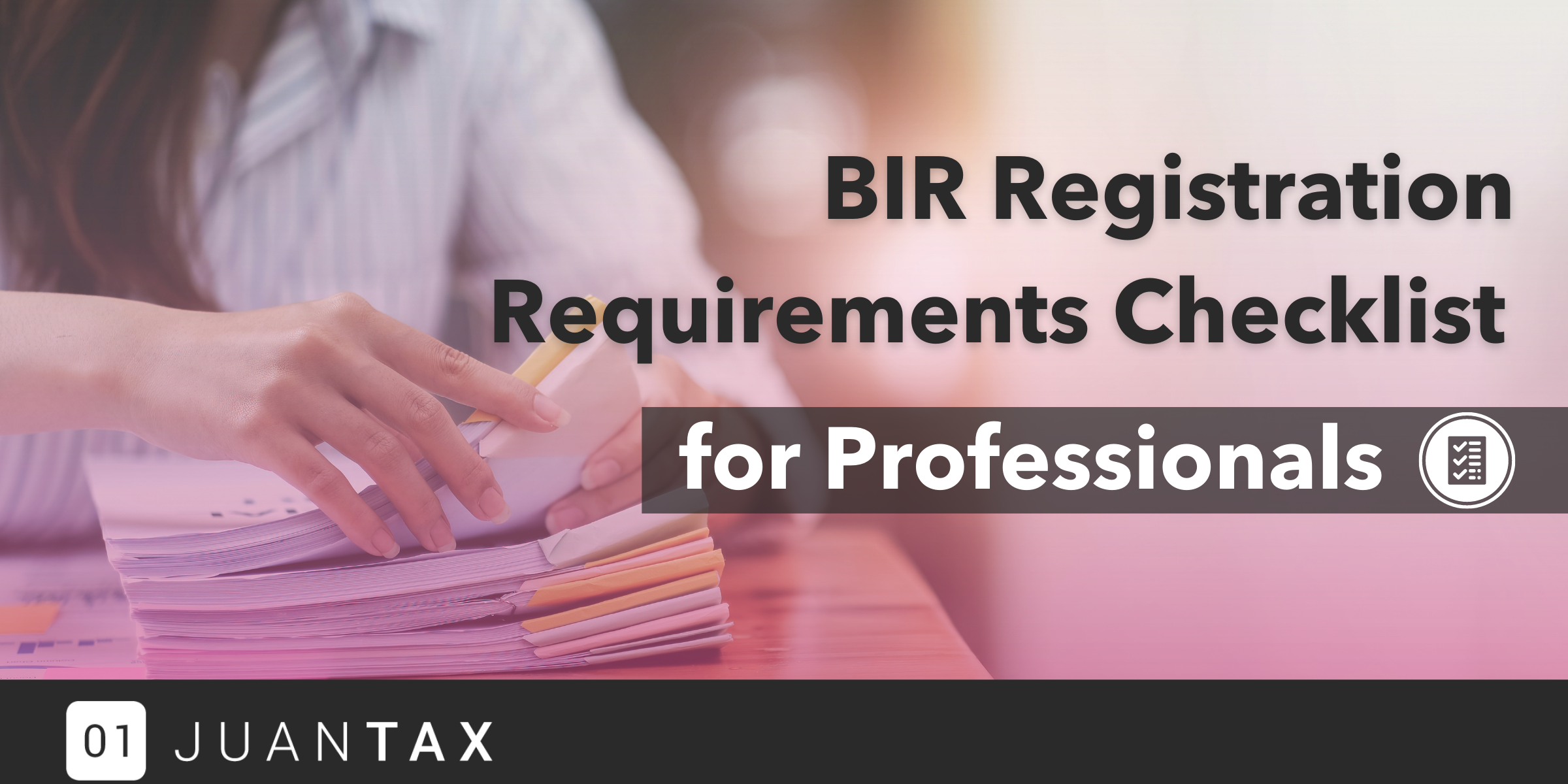As a professional who wants to engage in business activities in the Philippines, it is important to be aware of the requirement to register your business with the Bureau of Internal Revenue (BIR). This is because all businesses operating in the country, regardless of size or industry, are required to register with the BIR and obtain a Taxpayer Identification Number (TIN) in order to operate legally.
The process can be overwhelming and time-consuming to gather all the necessary documents and information. That’s why this topic on a checklist for BIR registration requirements for professionals is so important. A checklist provides a clear and concise guide for you to ensure that you have all the required documents and information before submitting your application for registration. It can help you avoid unnecessary delays or rejection of your application due to missing or incomplete requirements.
This topic aims to provide you with a comprehensive checklist of BIR registration requirements specifically tailored for professionals. By following this checklist, you can be confident that you have all the necessary requirements in order to successfully register your business with the BIR.
Documents Required for BIR Registration
Bureau of Internal Revenue (BIR) is a government agency responsible for administering and enforcing tax laws in the Philippines. If you are planning to start a business in the Philippines, you will need to register with the BIR to obtain a Taxpayer Identification Number (TIN) and comply with tax requirements.
When it comes to registering with the Bureau of Internal Revenue (BIR), there are several documents that professionals need to prepare and submit. Here are the following required documents:
- Professional Taxpayer Identification Number (PTIN) – A PTIN is a unique identification number assigned by the BIR to professionals who are required to pay taxes.
- Tax Identification Number (TIN) – A Tax Identification Number (TIN) is a unique identification number assigned by the Bureau of Internal Revenue (BIR) to individuals or entities for tax purposes. Once you have a (TIN), you can have a certificate of the Bureau of Internal Revenue (BIR) which contains a unique serial number.
- In other circumstances, when the taxpayer or business entity is applying for a TIN for the first time and there is a need to verify their identity or citizenship, you need to prepare your birth certificate.
- Barangay Clearance – A Barangay Clearance is a document issued by the Barangay Office certifying that the applicant is a resident or operating a business within the jurisdiction of the Barangay. It is required by the BIR as part of the registration process.
- SEC or DTI Registration Certificate (if applicable) – An SEC (Securities and Exchange Commission) or DTI (Department of Trade and Industry) Registration Certificate is required for professionals who are operating as corporations, partnerships or sole proprietorships. It serves as proof that the business has been registered with the appropriate government agency.
- Mayor’s Permit of Business Permit (if applicable) – A Mayor’s Permit or Business Permit is a document issued by the Local Government Unit (LGU) certifying that the business has complied with the necessary requirements and is allowed to operate within the area. It is required by the BIR as part of the registration process.
- Documentary Stamps – In the context of BIR registration, documentary stamps may be required to be affixed to certain documents, such as Articles of Incorporation or Partnership and Deeds of Sale, among others. The amount of documentary stamp tax to be paid depends on the nature of the document or instrument and the amount involved.
These documentary requirements are necessary to comply with BIR registration requirements and to avoid penalties and sanctions for non-compliance.

BIR Registration Process for Professionals
BIR (Bureau of Internal Revenue) registration is a vital step for professionals who are starting their own businesses or working independently. This process ensures that professionals comply with the Internal Revenue Code (IRC), tax laws and regulations set by the government. Registering with the BIR allows professionals to obtain a Professional Taxpayer Identification Number (PTIN) and Tax Identification Number (TIN), which are necessary for filing tax returns and paying taxes. In this article, we will discuss the step-by-step process of BIR registration for professionals and the documents required to complete the process.
- Obtain a Professional Taxpayer Identification Number (PTIN) by submitting an accomplished BIR Form 0605 and paying the corresponding PTIN registration fee.
- Apply for a Tax Identification Number (TIN) by submitting an accomplished BIR Form 1901. You will also need to present a valid government-issued ID, such as a passport or driver’s license; you are also required to provide your business address to the BIR.
- Obtain a Barangay Clearance from the barangay office where you reside or where your business is located.
- If applicable, obtain a registration certificate from the Securities and Exchange Commission (SEC) or the Department of Trade and Industry (DTI).
- If applicable, obtain a Mayor’s Permit or Business Permit from the local government unit where your business is located.
- Submit all the required documents to the BIR Revenue District Office (RDO) where you are registered. You may also need to attend a taxpayer seminar or orientation before your application is processed.
- Once your application is approved, you will be issued a Certificate of Registration (COR) and an Authority to Print (ATP) if you need to issue official receipts or invoices.
In conclusion, the BIR registration process for professionals may seem daunting at first, but it is a necessary step to comply with the law and avoid penalties. By following the steps outlined in this article, professionals can successfully register with the BIR and enjoy the benefits of compliance, such as the ability to issue official receipts and access government services.

BIR Tax Compliance Checklist for Professionals
The BIR Tax Compliance Checklist for Professionals is a comprehensive guide to help individuals ensure that they are following all the necessary tax requirements in the Philippines. It includes a list of tasks and obligations that must be fulfilled by professionals to stay compliant with tax laws and regulations.
- Secure a Professional Tax Receipt (PTR) annually and display it in a visible location in your office.
- File and pay your Income Tax Return (ITR) on or before the deadline set by the BIR. The deadline is usually on April 15 of the following year, unless otherwise specified.
- Keep accurate records of your income and expenses. This includes invoices, receipts, and other relevant documents that support your tax return.
- Register your books of accounts with the BIR and ensure that they are updated regularly.
- Comply with the requirements for Value-Added Tax (VAT) registration and payment, if applicable.
- If you have employees, register with the BIR as an employer and comply with the withholding tax requirements for compensation and other payments.
- Comply with the tax compliance requirements for specific professions, such as lawyers, doctors, and accountants.
- Pay the necessary taxes and fees, such as documentary stamp tax, local business tax, annual registration fee, certification fee and other applicable taxes.
- Ensure that you have the necessary permits and clearances to operate your business, if applicable.
- Attend taxpayer seminars and other training to keep yourself updated on tax laws and regulations.
By following the checklist, professionals can maintain accurate records, pay taxes on time, and access government services.
Benefits of BIR Registration for Professionals
Registering with the Bureau of Internal Revenue (BIR) is a necessary process for professionals who want to operate their businesses legally in the Philippines. While it may seem like a hassle, there are actually several benefits to BIR registration that can make a positive impact on your business.
The following are some of the key benefits of BIR registration for professionals:
- Compliance with the law: BIR registration is required by law for professionals who earn income from their services. By registering with the BIR, professionals can avoid penalties and legal sanctions for non-compliance with tax laws.
- Ability to issue official receipts: Registered professionals are authorized to issue official receipts for the services they render. Official receipts serve as proof of payment and are important for both the professionals and their clients.
- Access to government services: Registered professionals have access to various government services such as loans, grants, and other assistance programs. Being registered also provides proof of income, which may be required when applying for these services.
- Tax deductions and benefits: Registered professionals can claim tax deductions and benefits that are not available to non-registered individuals. These include deductions for expenses related to their profession, such as professional development and equipment costs.
- Build trust with your prospect or existing clients: Having a Certification for Registration from BIR can build trust with your prospect and/or existing clients, investors, and partners. This indicates that you are operating legally and are being monitored by government agencies and departments. You can use your BIR Form 1701A or annual income tax return as evidence of your income when applying for loans and credit cards.

Penalties and Sanctions for Non-Compliance with BIR Registration Requirements
Penalties and sanctions for non-compliance with BIR registration requirements can have serious consequences for professionals. It is important to be aware of these consequences and ensure that you comply with all BIR requirements to avoid any penalties or sanctions.
These are some of the possible penalties and sanctions for non-compliance with BIR registration requirements.
- Fines and penalties: The BIR may impose fines and penalties for failing to register or for late registration. The amount of the fine varies depending on the nature of the violation and the duration of the non-compliance.
- Interest charges: The BIR may also impose interest charges on any tax liability that remains unpaid after the due date.
- Compromise penalty: A compromise penalty may be imposed for any violation of the tax code, including non-compliance with registration requirements. The amount of the compromise penalty is generally lower than the regular penalty.
- Closure of business operations: The BIR may order the closure of a business for failing to register or comply with tax obligations.
- Suspension or revocation of professional licenses: For professionals, such as lawyers or accountants, the BIR may suspend or revoke their professional licenses for non-compliance with tax obligations.
- Criminal charges: In severe cases of non-compliance, the BIR may pursue criminal charges against the taxpayer, which can result in imprisonment or hefty fines.
In Summary
Non-compliance with BIR registration requirements can lead to various penalties and sanctions, including fines, interest charges, compromise penalties, closure of business operations, suspension or revocation of professional licenses, and even criminal charges. It is important for professionals to comply with BIR registration requirements and other policies of the BIR, in general, to avoid these penalties and ensure compliance with the law.
Attention, freelancers and independent professionals! Are you looking for an efficient way to stay tax compliant and simplify your accounting-related tasks? Look no further than Juan.
Juan integrates accounting, payments, financial reporting, and tax compliance with JuanTax into one complete solution, perfect for PH businesses. Experience all-in-Juan accounting and tax at https://www.juan.ac/.











